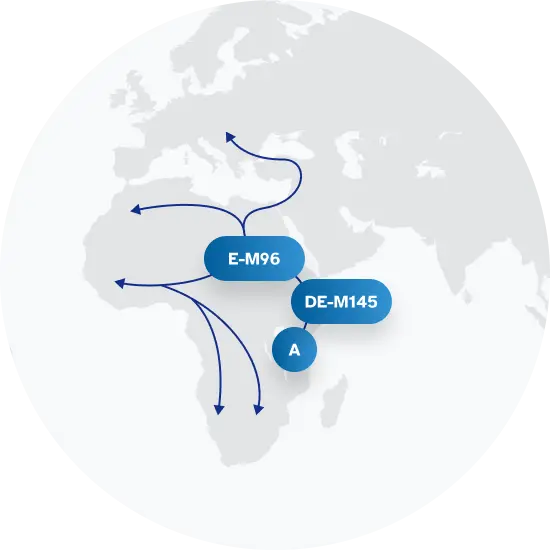Explore the Family Name Burnham
How common is the last name Burnham in the United States?
Based on the Decennial U.S. Census, the popularity of the surname Burnham has seen slight changes over a decade. In 2000, it held the rank of 2179 among all surnames in the United States, with a count of 15,299 and a proportion per 100k of 5.67. Ten years later in 2010, the rank slightly dropped to 2315 despite an increase in count to 15,775 which represents a growth of 3.11%. The proportion per 100k also decreased by 5.64% to 5.35.
| 2000 | 2010 | Change | |
|---|---|---|---|
| Rank | #2,179 | #2,315 | -6.24% |
| Count | 15,299 | 15,775 | 3.11% |
| Proportion per 100k | 5.67 | 5.35 | -5.64% |
Race and Ethnicity of people with the last name Burnham
As for the ethnic identity associated with the surname Burnham, data from the Decennial U.S. Census shows some shifts between 2000 and 2010. The largest group, identifying as White, saw a slight decrease from 92.73% to 90.95%. Those identifying as Asian/Pacific Islander and Hispanic saw increases of 38.78% and 42.67%, respectively. Black identification also rose 14.87% while American Indian and Alaskan Native saw a decrease by 23.44%. Finally, those identifying with two or more races increased by 46.72%, indicating a growing diversity among individuals with the Burnham surname.
| 2000 | 2010 | Change | |
|---|---|---|---|
| White | 92.73% | 90.95% | -1.92% |
| Black | 3.43% | 3.94% | 14.87% |
| Hispanic | 1.5% | 2.14% | 42.67% |
| Two or More Races | 1.22% | 1.79% | 46.72% |
| Asian/Pacific Islander | 0.49% | 0.68% | 38.78% |
| American Indian and Alaskan Native | 0.64% | 0.49% | -23.44% |
Burnham ancestry composition
23andMe computes an ancestry breakdown for each customer. People may have ancestry from just one population or they may have ancestry from several populations. The most commonly-observed ancestry found in people with the surname Burnham is British & Irish, which comprises 55.1% of all ancestry found in people with the surname. The next two most common ancestries are French & German (23.7%) and Scandinavian (4.6%). Additional ancestries include Eastern European, Spanish & Portuguese, Italian, Ashkenazi Jewish, and Indigenous American.
Ready to learn more about your ancestry? Get the most comprehensive ancestry breakdown on the market by taking our DNA test. Shop 23andMe
| ANCESTRY BREAKDOWN | COMPOSITION |
|---|---|
| British & Irish | 55.1% |
| French & German | 23.7% |
| Scandinavian | 4.6% |
| Other | 16.6% |

Possible origins of the surname Burnham
Your DNA provides clues about where your recent ancestors may have lived. Having many distant relatives in the same location suggests that you may all share common ancestry there. Locations with many distant relatives can also be places where people have migrated recently, such as large cities. If a large number of individuals who share your surname have distant relatives in a specific area, it could indicate a connection between your surname and that location, stemming from either recent ancestral ties or migration.
Based on 23andMe data, people with last name Burnham have recent ancestry locations all within the United Kingdom of Great Britain and Northern Ireland.
| RECENT ANCESTRY Location | Percentage |
|---|---|
| Greater Manchester, United Kingdom | 87.50% |
| Glasgow City, United Kingdom | 87.50% |
| Greater London, United Kingdom | 87.50% |
| West Midlands, United Kingdom | 87.50% |
| Merseyside, United Kingdom | 87.30% |
What Burnham haplogroups can tell you
Haplogroups are genetic population groups that share a common ancestor on either your paternal or maternal line. These paternal and maternal haplogroups shed light on your genetic ancestry and help tell the story of your family.
The top paternal haplogroup of people with the surname Burnham is E-M123, which is predominantly found among people with European ancestry. Haplogroup E-M123 is descended from haplogroup E-M96. Other common haplogroups include R-DF98 and R-P311, which are predominantly found among people with European and European ancestry. Other surnames with similar common haplogroups are: Shirley, Hahn, Walters, Schafer, Hood, Watson, Freeman, Wall, Stephens, Muller.
The most common maternal haplogroups of people with Burnham surname are: H1, T2b, H. These most commonly trace back to individuals of European ancestry.
 Paternal Haplogroup Origins E-M96
Paternal Haplogroup Origins E-M96
Your paternal lineage may be linked to many Jewish populations
Although haplogroup E-M123 is common throughout the Middle East, especially among populations such as the Bedouin, Omanis and Druze, it appears particularly frequently in Jewish populations. The lineage averages 10% among both Ashkenazim from eastern Europe and Sephardic Jews from Iberia. About 15% of Ethiopian Jews also carry the haplogroup, although they may be more closely related to other Ethiopians than to other Jewish populations bearing E-M123. Jews from Yemen carry E-M123 at levels of about 10%, and about 20% of Libyan Jewish men belong to the haplogroup. Given the clearly elevated frequency in all Jewish populations, E-M123 was very likely present in the ancestral Jewish population from the Levant that dispersed throughout the Old World about 2,000 years ago.
Your maternal lineage may be linked to Marie Antoinette
Because it is so dominant in the general European population, haplogroup H also appears quite frequently in the continent's royal houses. Marie Antoinette, an Austrian Hapsburg who married into the French royal family, inherited the haplogroup from her maternal ancestors. So did Prince Philip, Duke of Edinburgh, whose recorded genealogy traces his female line to Bavaria. Scientists also discovered that famed 16th century astronomer Nicolaus Copernicus traced his maternal lineages to haplogroup H.

What do people with the surname Burnham have in common?
Spoiler alert: it's complicated. People with the same last name are usually no more genetically similar than a randomly sampled group of people from the same population. That said, people with the same surname are more likely to have similar ancestries than randomly sampled individuals. The reason is the tendency of people with similar cultural or geographical backgrounds to preferentially mate with one another. That's why people who share a surname may be more likely to share traits and tendencies in common than people within the general population. Check out the percentages below to see the prevalences of tastes, habits, and traits of people with your surname compared with prevalences among 23andMe users.
Preferences
Traits
Habits
Wellness
Are health conditions linked to the last name Burnham?
The short answer is that, if there is an association between surname and health, it's usually more about your ancestry than your name. Individuals with a given surname are no more genetically similar than the general population but often have similar ancestries. The populations of people associated with those shared ancestries often have sets of genetic variations, also known as alleles, in common. Some of those alleles are associated with a greater likelihood of developing certain diseases.
Disease variant frequency by ancestry
Disease allele frequencies in populations associated with the surname Burnham are shown below. Important Note: not everyone with a disease allele will develop these health condition
























